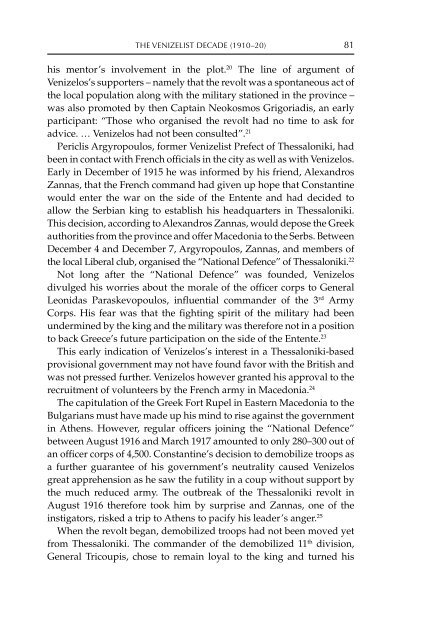MODERN GREECE: A History since 1821 - Amazon Web Services
MODERN GREECE: A History since 1821 - Amazon Web Services
MODERN GREECE: A History since 1821 - Amazon Web Services
Create successful ePaper yourself
Turn your PDF publications into a flip-book with our unique Google optimized e-Paper software.
THE VENIZELIST DECADE (1910–20) 81<br />
his mentor’s involvement in the plot. 20 The line of argument of<br />
Venizelos’s supporters – namely that the revolt was a spontaneous act of<br />
the local population along with the military stationed in the province –<br />
was also promoted by then Captain Neokosmos Grigoriadis, an early<br />
participant: “Those who organised the revolt had no time to ask for<br />
advice. … Venizelos had not been consulted”. 21<br />
Periclis Argyropoulos, former Venizelist Prefect of Thessaloniki, had<br />
been in contact with French officials in the city as well as with Venizelos.<br />
Early in December of 1915 he was informed by his friend, Alexandros<br />
Zannas, that the French command had given up hope that Constantine<br />
would enter the war on the side of the Entente and had decided to<br />
allow the Serbian king to establish his headquarters in Thessaloniki.<br />
This decision, according to Alexandros Zannas, would depose the Greek<br />
authorities from the province and offer Macedonia to the Serbs. Between<br />
December 4 and December 7, Argyropoulos, Zannas, and members of<br />
the local Liberal club, organised the “National Defence” of Thessaloniki. 22<br />
Not long after the “National Defence” was founded, Venizelos<br />
divulged his worries about the morale of the officer corps to General<br />
Leonidas Paraskevopoulos, influential commander of the 3 rd Army<br />
Corps. His fear was that the fighting spirit of the military had been<br />
undermined by the king and the military was therefore not in a position<br />
to back Greece’s future participation on the side of the Entente. 23<br />
This early indication of Venizelos’s interest in a Thessaloniki-based<br />
provisional government may not have found favor with the British and<br />
was not pressed further. Venizelos however granted his approval to the<br />
recruitment of volunteers by the French army in Macedonia. 24<br />
The capitulation of the Greek Fort Rupel in Eastern Macedonia to the<br />
Bulgarians must have made up his mind to rise against the government<br />
in Athens. However, regular officers joining the “National Defence”<br />
between August 1916 and March 1917 amounted to only 280–300 out of<br />
an officer corps of 4,500. Constantine’s decision to demobilize troops as<br />
a further guarantee of his government’s neutrality caused Venizelos<br />
great apprehension as he saw the futility in a coup without support by<br />
the much reduced army. The outbreak of the Thessaloniki revolt in<br />
August 1916 therefore took him by surprise and Zannas, one of the<br />
instigators, risked a trip to Athens to pacify his leader’s anger. 25<br />
When the revolt began, demobilized troops had not been moved yet<br />
from Thessaloniki. The commander of the demobilized 11 th division,<br />
General Tricoupis, chose to remain loyal to the king and turned his


